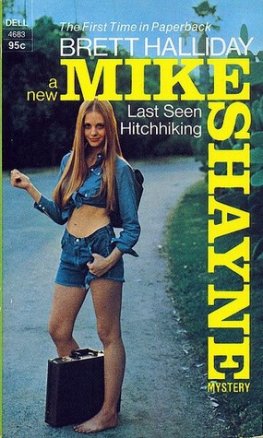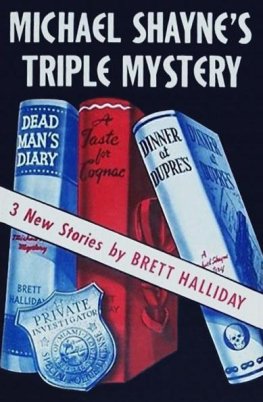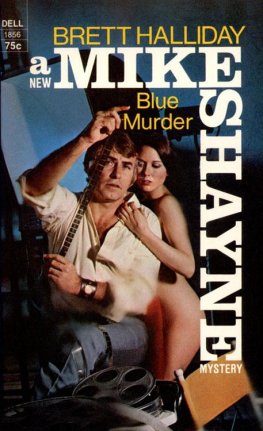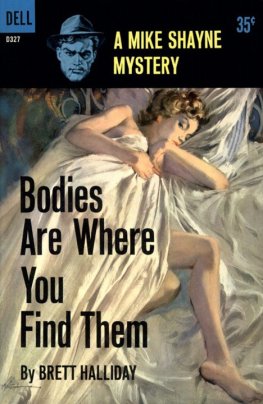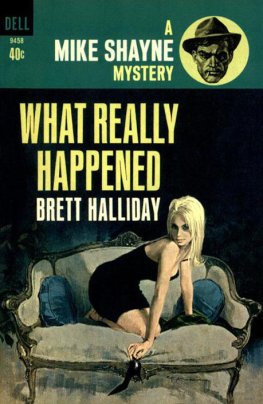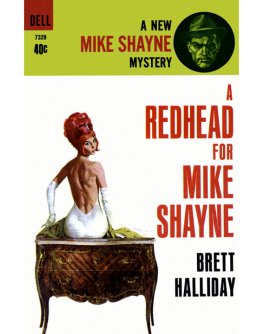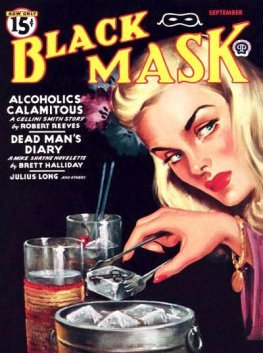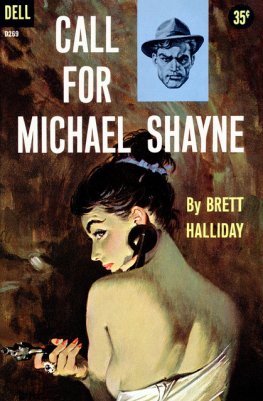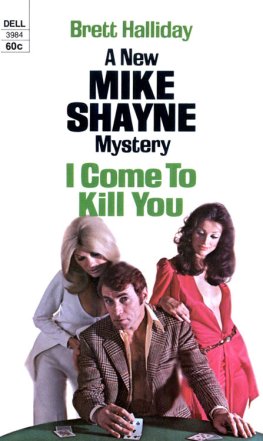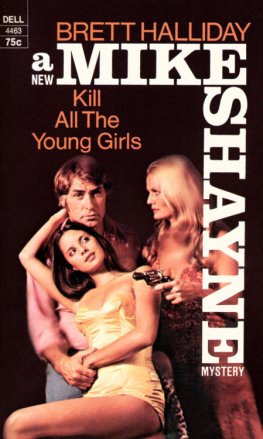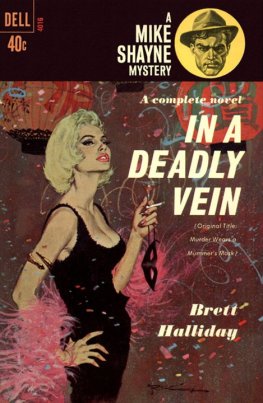Brett Halliday - Last Seen Hitchhiking
Here you can read online Brett Halliday - Last Seen Hitchhiking full text of the book (entire story) in english for free. Download pdf and epub, get meaning, cover and reviews about this ebook. year: 1974, publisher: Dell, genre: Detective and thriller. Description of the work, (preface) as well as reviews are available. Best literature library LitArk.com created for fans of good reading and offers a wide selection of genres:
Romance novel
Science fiction
Adventure
Detective
Science
History
Home and family
Prose
Art
Politics
Computer
Non-fiction
Religion
Business
Children
Humor
Choose a favorite category and find really read worthwhile books. Enjoy immersion in the world of imagination, feel the emotions of the characters or learn something new for yourself, make an fascinating discovery.
- Book:Last Seen Hitchhiking
- Author:
- Publisher:Dell
- Genre:
- Year:1974
- Rating:3 / 5
- Favourites:Add to favourites
- Your mark:
- 60
- 1
- 2
- 3
- 4
- 5
Last Seen Hitchhiking: summary, description and annotation
We offer to read an annotation, description, summary or preface (depends on what the author of the book "Last Seen Hitchhiking" wrote himself). If you haven't found the necessary information about the book — write in the comments, we will try to find it.
Last Seen Hitchhiking — read online for free the complete book (whole text) full work
Below is the text of the book, divided by pages. System saving the place of the last page read, allows you to conveniently read the book "Last Seen Hitchhiking" online for free, without having to search again every time where you left off. Put a bookmark, and you can go to the page where you finished reading at any time.
Font size:
Interval:
Bookmark:
Brett Halliday
Last Seen Hitchhiking
Chapter 1
Laws prohibiting hitchhiking usually go roaring through, with a minimum of nays. Every member of every state legislature owns his own automobile; it is one of the unwritten conditions of being elected to office. Knowing how unlikely it is that he will ever find himself standing at the edge of a highway ramp with his thumb up, he has no hesitation in legislating against the practice.
But these are curious laws. Who is being protected, hitchhiker or motorist? No doubt the motorist, but no one has compelled him to pick up the hitchhiker, just as no one has compelled the hitchhiker to hitch. In every big city there is more crime on some streets than on others, but it is not illegal to walk those streets. To some authorities, anti-hitchhiking and anti-vagrancy statutes are closely related attempts by settled communities to keep out itinerant strangers with no means of support. But there seems to be more to it than that. Hitchhikers, of course, would be silly to carry much money, but often they are students with access to money, not bums or tramps or drifters, who, if stranded, may do mischief or become charges on the public treasury. And yet the state troopers are as harsh with students hitching home from an expensive college as they are with truly penniless outsiders. It is not that hitchhikers are against automobiles; they travel in automobiles. But they are against the ownership of automobiles the insurance, the 18-percent loans, the worries, the repairs, the status competition, the tensions of driving in expressway traffic, the parking problems. And this goes to the bone. State troopers, whose days are spent moving up and down the highway, are believers. They never would have taken up this line of work if they hadnt loved cars. Cars are their specialty. They can tell a make and a model year at a glance, from eight hundred yards. And that may explain their savagery to hitchhikers. Not the hair, the dope, the freedom; hitchhikers adhere to the wrong religion. They are parasites, along for the ride. They have all the fun, none of the hassles. If the car they are in breaks down, they look for another ride. Clearly hitchhikers cannot claim the protection of the first ten constitutional amendments, which were adopted before the invention of the gasoline engine.
In spite of everything, hitchhiking flourishes, and this is probably a good thing. A car with a hitcher aboard consumes no more fuel and spews out no more hydrocarbons. Hitching has a history and a tradition and hundreds of thousands of adherents. It is cheap and convenient. It sometimes leads to surprising adventures.
Meri Gillespie was twenty-three. She had been a platform diver in college competition, and she still worked out two or three mornings a week, not as often as she would have liked. Under her sloppy traveling clothes a loose work-shirt with the cuffs turned back twice, torn-off jeans her body was trim and sleek. Her shoulder-length blond hair, washed that morning, was now in somewhat of a tangle. A much-used knapsack was slung over one shoulder.
Her first ride, the one she had arranged herself, took her out of Miami and to the Tamiami interchange on 826, The Palmetto expressway. She was waiting a few yards in on the northbound ramp. It was midafternoon. She was the only hitcher on the ramp.
A car passed, accelerating. The driver gave her a surprised sideways glance.
When she received the same kind of glance from the next car, she checked her appearance. Were too many shirt buttons open? No, only two, and there was nothing unusual about the rest of her costume, which was what most young people wore on the road. She was upset, jangly. Her perceptions were unnaturally clear. She was still enormously excited, a little in awe of herself, for she had just committed a crime. It had been justified, she thought, but it was incredibly risky. Most juries, she was afraid, would refuse to listen to excuses or explanations, and would put her in jail for years.
Still, she had no reason to think that any of this showed. In sunglasses, her hand resting carelessly on her knapsack because to raise a thumb or to signal in any way was against the rules, she thought she must look reasonably composed, a college girl just finished with her midyear exams and on her way home for a quick vacation.
Two women in another passing car pointed her out to each other. She did seem to be attracting the wrong kind of attention. And suddenly she remembered a headline in the Daily News. She didnt read newspapers as a rule; there was too much else going on. She had looked at the first few paragraphs, but hadnt followed the story inside the paper. A missing girl had been found somewhere in the northern part of the state. She had been butchered, and the pieces of her body had been buried rather carelessly in loose sand several hundred yards from a public beach. She had been hitchhiking. Another party of hitchers on the opposite access ramp had seen her accept a ride, and that was the last time she had been seen alive.
Meri knew perfectly well why she hadnt read the story. She had been hitching since fourteen and had never had an ounce of trouble she couldnt handle. She had no intention of giving it up. The year she left home to go to college there had been a spectacular series of hitchhiking murders in Massachusetts. The victims it seemed to be standard again had been girls in their late teens and early twenties. There was a pattern the single girl hitchhiker, the failure to arrive at the destination, the excitement, the discovery of the body. Meris parents had begged her, and had finally ordered her to travel in public transportation. She had pretended to accede, going in one door of the bus depot and out the other, and those had been some of her most interesting rides. The point was, there were psychotics on the highways, as there were psychotics everywhere, even among college professors. But Meri had confidence in her own judgment and in her ability to look out for herself. She was deceptively strong. She could pick up the front end of a Volkswagen. She could beat almost anyone at arm-wrestling. She didnt automatically take the first ride that came along. If there was only one driver, she talked to him for a minute before getting in. She didnt carry a destination sign. If the wrong signals came out of the car, if she smelled gin or if the man looked too hard at her breasts or didnt look at them at all, she simply said she was looking for a ride that would go all the way, and stepped back and closed the door.
Naturally she made an occasional mistake. She remembered one driver, an infantry colonel, who kept having the sensation that Russian Communists were trying to jerk the road out from under his wheels. Overcorrecting, he ran across the divider and dodged back and forth through the oncoming traffic. She very nearly didnt descend safely from that one. Over the years there had been many dykes, several stoned carloads who had wanted her to join in multi-person sex, not excluding the driver, while cruising the Interstate at seventy miles an hour. She had handled all these crises with a minimum of difficulty. She was sincerely convinced that it was less dangerous to hitch than to travel by airplane. Airplanes crashed. Or they were hijacked. And the people you met on airplanes were so bland and predictable.
A car pulled past, getting well into the curve, then stopped and backed up. It was a station wagon, not in good shape, with a university sticker on the rear window. The driver was round-faced, with turn-up shades clipped to wire-rimmed glasses. He was a little overweight. A corner was missing from one of the teeth in his smile. He was driving barefoot.
He flipped up his shades. That was a double-take, in case you dont recognize it. Dont I know you? From school, maybe?
Font size:
Interval:
Bookmark:
Similar books «Last Seen Hitchhiking»
Look at similar books to Last Seen Hitchhiking. We have selected literature similar in name and meaning in the hope of providing readers with more options to find new, interesting, not yet read works.
Discussion, reviews of the book Last Seen Hitchhiking and just readers' own opinions. Leave your comments, write what you think about the work, its meaning or the main characters. Specify what exactly you liked and what you didn't like, and why you think so.

